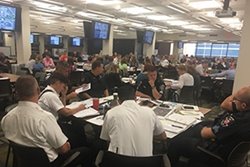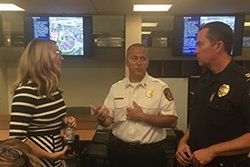Milwaukee Regional Medical Center (MRMC) organizations are committed to providing services and ensuring the safety of patients, visitors and employees during a disaster or other emergency situation.
On-campus organizations of MRMC include Froedtert Hospital, Children’s Wisconsin Hospital, Medical College of Wisconsin, Versiti Blood Center of Wisconsin, and Curative Care.
MRMC’s organizations collaborate on emergency preparedness with local police and fire departments and the community. Their preparedness includes planning of and participation in annual campus-wide disaster exercises, development of campus emergency coordination and emergency communication plans and staffing of 24/7 on-call disaster response positions to ensure an integrated response.
This type of prepared response is especially critical for MRMC as eastern Wisconsin’s only academic medical center with both an adult Level 1 Trauma Center and a pediatric Level 1 Trauma Center. Because of its key role, MRMC also works with other organizations in the southeastern Wisconsin region and the state to improve disaster preparedness and response efforts.
Campus Emergency Notification Process
MRMC has developed a unique emergency notification system that uses a standardized communication protocol and alerting system to notify all of the entities on campus, as well as identified external partners, of an event that has the potential to impact the normal operations.
Tabletop and Full-Scale Exercises
Annual disaster exercises are a federal requirement for all hospitals in the U.S., but MRMC’s emergency preparedness initiative is a collaboration rarely found in other parts of the country. MRMC’s combination of separate hospitals, clinics, a medical university, research facilities and health service providers in a single location provides a unique opportunity in disaster medicine. The campus’ member organizations conduct disaster exercises multiple times each year to practice and coordinate response measures and remain prepared to respond to a real large-scale emergency. This includes tabletop, functional and full-scale exercises.
preparedness initiative is a collaboration rarely found in other parts of the country. MRMC’s combination of separate hospitals, clinics, a medical university, research facilities and health service providers in a single location provides a unique opportunity in disaster medicine. The campus’ member organizations conduct disaster exercises multiple times each year to practice and coordinate response measures and remain prepared to respond to a real large-scale emergency. This includes tabletop, functional and full-scale exercises.
 Tabletop exercises involve using written scenarios to discuss processes, plans and actions that would be taken in a real event. Functional exercises test a specific area, group or process. Full-scale exercises involve actual use of personnel and equipment from throughout the organization to respond to staged incidents and treat simulated live-actor patients. This allows our members to test their ability to safely manage their operations and provide treatment for a large influx of patients in a short timeframe. All of this improves MRMC’s ability to coordinate resources and response for the full scope of a major incident.
Tabletop exercises involve using written scenarios to discuss processes, plans and actions that would be taken in a real event. Functional exercises test a specific area, group or process. Full-scale exercises involve actual use of personnel and equipment from throughout the organization to respond to staged incidents and treat simulated live-actor patients. This allows our members to test their ability to safely manage their operations and provide treatment for a large influx of patients in a short timeframe. All of this improves MRMC’s ability to coordinate resources and response for the full scope of a major incident.
Regional Emergency Preparedness
Health care readiness also increases overall community resiliency. MRMC actively participates in the Wisconsin Healthcare Emergency Preparedness Program (WHEPP), which supports health care sector emergency preparedness planning and response to mass casualty or other medical disasters. MRMC is also a member of the Southeast Wisconsin Healthcare Emergency Readiness Coalition (SE HERC Region 7). HERC Region 7 works to promote the southeast Wisconsin region’s health care readiness, and is designing a response and recovery framework for use during and after an emergency.
Demonstrated Leadership During Emergency Situations
Mass Casualties
Froedtert Hospital and Children's Wisconsin activated their emergency response systems to care for the influx of patients from incidents such as the Miller Coors shooting, Fiserv Forum shootings, and the Waukesha parade disaster.
Infectious Disease Outbreaks
During both the Ebola outbreak in 2014 and the recent COVID-19 pandemic, the Milwaukee Regional Medical Center served as a key resource for patient care and reliable information. MRMC member organizations and their staffs worked around-the-clock to care for the surge of patients and to conduct important scientific research to improve the understanding of those infectious disease outbreaks. MRMC members took a lead role in providing accurate, timely updates to the community on the status of the epidemics.